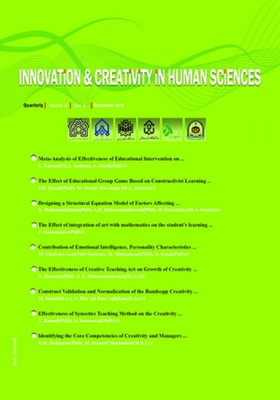Developing a Structural Equation Model of Factors Affecting tend to Critical Thinking of Teachers of Karaj Education Dept., District 4.
Subject Areas : Creativity and innovation from managerial, organizational, industrial, creativity and innovation
Kamran Mohammad Khani
1
*
,
Amir Hosrin MohammadDavidi
2
![]() ,
Maryam Farokh Nia
3
,
Maryam Farokh Nia
3
1 - گروه مدیریت آموزش عالی، دانشکده اقتصاد و مدیریت، دانشگاه آزاد اسلامی واحد علوم و تحقیقات، تهران، ایران.globecampus@gmail.com
2 - گروه مدیریت آموزشی، دانشکده علوم انسانی، دانشگاه آزاد اسلامی واحد ساوه، ساوه، ایران.adavoudi838@yahoo.com
3 - گروه مدیریت آموزشی، دانشکده علوم انسانی، دانشگاه آزاد اسلامی واحد ساوه، ساوه، ایران.mfarokhniya@yahoo.com
Keywords: spiritual intelligence, tend to critical thinking, Ethical Leadership, organizational lerning,
Abstract :
Background: This study aimed to design a structural equation model of effective factors on the teachers' tendency toward critical thinking. Method: Research statistical population consisted of teachers of district 4 of Karaj. Considering that how and what extent the influence of this factors can be done with using structural equation and analyzing of factors. Methods, in terms of descriptive data collection approach, are the kind of measurement and objective. The instrument used in this study is standard questionnaires tended to critical thinking Ricketts, questionnaires for the measuring of ethical leadership is Dahoogh, and to meeting of spiritual intelligence has been applied Heldberent questionnaire and organizational learning based on Nife model, the final question was 57 and 375 samples were randomly selected that sample size is according to category relative formula based on Morgan table. Content reliability of questionnaire was confirmed by experts and other to analyze the data was used Pearson correlation and LISREL software and structural equation modeling. Findings: The result showed that the extent of the tendency critical thinking, emotional, intelligence, ethical leadership and teachers' organizational learning were higher than average value. There was a significant positive correlation between effective factors to critical thinking involving moral leadership, spiritual intelligence and organizational learning. Result: As a result of the factors that could affect critical thinking, ethical leadership, and organizational learning were spiritual intelligence.
اکبری، ابولفضل. (1387). بررسی میزان تفکر انتقادی در بین معلمان فریمان. پایان نامه کارشناسی ارشد، دانشگاه فردوسی مشهد.
اکبری، مرضیه؛ کریمی، فریبا. (1393). الگوی روابط بین قابلیت یادگیری سازمانی و هوش سازمانی با رفتار شهروندی سازمانی کارکنان دانشگاه. فصلنامه رهیافتی نو در مدیریت آموزشی، 5 (2).
اکبری فریمانی، محمد. (1389). بررسی میزان تفکر انتقادی معلمان آموزش و پرورش شهر فریمان و عوامل مؤثر بر آن، پایان نامه کارشناسی ارشد، دانشگاه فردوسی مشهد.
اکبری، عباس. (1390). ارتباط مدیریت دانش و هوش اخلاقی با یادگیری سازمانی در دبیرستان های ساوه. پایان نامه کارشناسی ارشد، دانشگاه ساوه.
الزامی، عصمت. (1391). بررسی رابطه سبک های رهبری مدیران با یادگیری سازمانی در مدارس متوسطه شهر ری. پایان نامه کارشناسی ارشد، دانشگاه تربیت دبیر شهید رجایی.
پاک مهر، حمیده؛ دهقانی، مرضیه.(1389). رابطه باورهای خودکارآمدی و گرایش به تفکر انتقـادی دانشجویان تربیت معلم، مجموعه مقالات دهمین همایش انجمن مطالعات برنامه درسـی ایـران، برنامه درسی تربیت معلم.
حمیدی، فریده؛ صداقت، حسین. (1391). بررسی مقایسه ای هوش معنوی دانش آموزان دوره ی متوسطه بر اساس جنسیت و پایه تحصیلی. زن در فرهنگ و هنر، 4 (4).
جاویدی کلاته جعفر آبادی، طاهره، عبدلی، افسانه، (1389). روند تحول تفکر انتقادی در دانشجویان دانشگاه فردوسی مشهد. مطالعات تربیتی و روان شناسی، 11(2) ، 103-120.
خاوری، زهرا. (1390). بررسی عوامل مؤثر بر تفکر انتقادی در بین دانش آموزان متوسطه شهر مشهد. پایان نامه کارشناسی ارشد، دانشگاه الزهرا.
رامبد، معصومه. (1391). تفکر انتقادی در آموزش و یادگیری دانشجویان. مجله علمی علوم پزشکی صدرا، دانشگاه شیراز.
صالح نیا، منیره. (1391). اثر رهبری اخلاقی بر فضای اخلاقی سازمان. فصلنامه اخلاق در علوم و فناوری.7 (2).
عبداله زاده، حسن؛ باقرپور، معصومه؛ بوژمهرانی، سمانه؛ و لطفی، محدثه. (1388). هوش معنوی. تهران: انتشارات روان سنجی.
کریمی، هدی. (1391). پیش بینی به تفکر انتقادی بر اساس هوش معنوی و خلاقیت. پایان نامه کارشناسی ارشد، دانشگاه شیراز.
محمد داودی، امیر حسین، اشتری، عزت(1390). راﺑﻄﻪ رﻫﺒﺮی ﻣﻌﻨﻮی و ﻳﺎدﮔﻴﺮی ﺳﺎزﻣﺎﻧﻲ در ﻣﺪارس ﻣﺘﻮﺳﻄﻪ. ﻓﺼﻠﻨﺎﻣﻪ رﻫﺒﺮی و ﻣﺪﻳﺮﻳﺖ آﻣﻮزﺷﻲ،ﺳﺎل پنجم،شماره3، ﭘﺎﻳﻴﺰ1390، 31-49.
هرست، وایت. (1388). فلسفه آموزش و پرورش،موضوعات اصلی در سنت تحلیلی، ترجمه بختیار شعبانی ورکی. مشهد: به نشر.
هومن، حیدر علی. (1384). مدل یابی معادلات ساختاری، ویرایش دوم. تهران: سمت.
Billings, D. M. & Halstead, J. A. (2005). Teachingin nursing: a guide for faculty. Publishing Services Manager.
Ess, Charles (2004). Critical thinking and the Bible in the age of new media. USA: University Press of America.
Ku, K. Y. L. (2009). Assessi ng students’ critical thinking performance: Urging for measurements using multi-response format.Thinking Skills and Creativity, 4: 70–76.
Lyutykh,E. (2009). Practicing critical thinking in an educational psychology classroom.Journal of educational studies,45(4):
377-391.
Marin, L. M., Halpern, D. F. (2011). Pedagogy for developing critical
thinking in adolescents: Explicit instruction produces greatest
gains. Thinking Skills and Creativity, 6: 1-13.
Profetto, M. G. J. (2003). The relationship of critical thinking skills and critical thinking dispositions of baccalaureate nursing students.Journal Advance Nurse, 43(6): 569-577.
Ricketts, J. C. (2003). The Efficacy of Leader ship Development, Critical Thinking Dispositions, and Students Academic Performance on the Critical Thinking Skills of Selected Youth Leaders.Dissertation Presented to the Graduate School of the University of Florida in Partial Fulfillment of the Requirements for the Degree of Doctor of Philosophy,
Stapleton, P. (2011). A survey of attitudes towards critical thinking among Hong Kong secondary school teachers: Implications for policy change. Thinking Skills and Creativity, 6(1): 14–23.

